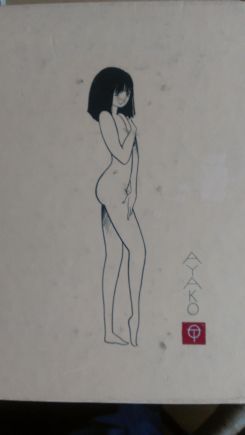
“All o’ya apologize t’Ayako!! It ain’ possible t’turn back th’ clock…But at least, in regards t’that clan meet…ya can all get on yer knees’n apologize!!”
As a member with a large number of relatives living near me, I have no shortage of running into family drama. The women in my family gossip a lot and talk about each other like mad. These have led to some tense conversations over the years. I get annoyed, but after reading Osamu Tezuka’s Ayako, I realized how lucky I am and how you might be too if you’re part of a big family. It makes you wonder how much family members are willing to hurt each other to protect the things they treasure the most.
The story covers a young girl living in post-WWII Japan named Ayako Tenge and her involvement over a crime committed by one of her family members. To prevent police from getting involved in their affairs, her father throws her into a cellar and locks her there for the rest of her life. Over time, Ayako becomes accustomed to her dark surroundings and becomes fearful to step out into society. The history of the Tenge family is revealed as they bred with each other constantly in order to survive for 500 years. Ayako finally goes outside after 20+ years in the cellar and her “rebirth” unleashes the repressed anger and resentment held by the other Tenge members.
Family drama can happen because of people’s tendencies to judge one’s character instead of being objective about them. They will criticize any slight difference they have that bothers them. Sometimes, those same critics will use other people’s opinions to validate their concerns about the behaviors of others. Some people also start drama because they are energy vampires. They crave attention and drain yours to get it. Those types of folks are technically aware of what they are doing. In the end, what it comes down to is stress impacting the brain to think and react differently.
The nature of Japan’s state after WWII greatly affected the Tenge family, but it hurt one member, Jiro Tenge, the most. He comes back home to see his family disgruntled over possibly losing their lands to the government. Jiro feels ashamed for betraying his comrades during WWII. He decides to commit assassinations on rival political faction members, but becomes the main reason for Ayako’s treatment. Jiro talks about how he wanted to leave behind his warped bloodline, but becomes as corrupt as his family members. Two other family members, Naoko and Shiro, started off as pleasant people concerned about Ayako, but both didn’t make any conscious and meaningful effort to save her from her misery.
What Ayako illustrates is that for things to settle down, everyone should have a meaningful talk with each other without hidden agendas. Lay it all out there on the table to create a honest, open-ended and encouraging environment. One thing to avoid is taking on a passive-aggressive nature. There were scenes where Shiro argues in a mocking manner with another Tenge member, Ichiro, about the family’s dark past and Ayako. Nothing good comes out of being indirect. Compassion plays a big role, but it has to lead to some sense of action.
There were few attempts to save Ayako when she was a child, due to the fact that whoever did so would get killed by the Tenge family. What can one person do against a family culture that’s been ingrained for about half a millennia? The one thing to do is train your mind to be able to better react to the negativity around you. Unfortunately, not everyone believes in their own potential to do positive things. It helps if there are outside forces with different opinions who come by and lend their words to you. There’s a reason why the term “family and friends” exist. The Tenge family isolated themselves completely for the sake of their own greed. Good people in bad situations give in over time as they get used to reinforced negativity around them. Ayako is a living example of what the Tenge family became over the last few years of their existence – trapped by the fear of life moving past them.
Maybe it all comes down to fixing the system and not just the self. Broken systems tend to be greatly affected by their creators’ own inner bias. The Tenge family meets their end, but not everyone is lucky to gain freedom from their situations and it takes a while for change to happen.
Even though forces beyond your control may cause stress, you still have the choice of altering the script to your drama for a better ending.
Ayako can purchased via Amazon and wherever books are sold.
(c) Manga Therapy – Where Psychology & Manga Meet – Read entire story here.